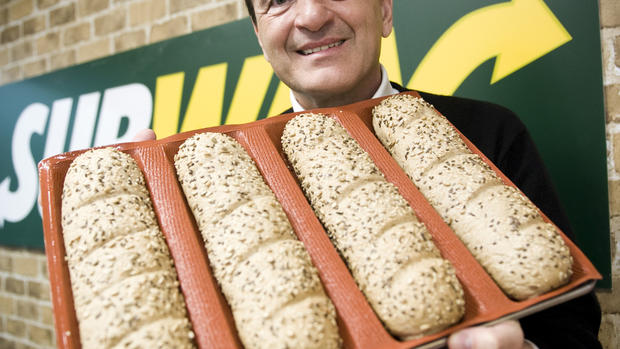Subway: No more "yoga mat" chemical in our bread
Subway, the popular sandwich chain, has announced the ingredient dubbed the "yoga mat chemical" will be entirely phased out of its bread by this week.
The disclosure comes after Subway suffered from an onslaught of bad publicity sparked by a food blogger who petitioned the chain to remove the ingredient.
The chemical is also used to make yoga mats.
Tony Pace, Subway's chief marketing officer, told the Associated Press that the chain had started phasing out the ingredient late last year and that the process should be completed this week. Subway is privately held and doesn't disclose its sales figures. But it has apparently been feeling pressure from the uproar.
"You see the social media traffic, and people are happy that we're taking it out, but they want to know when we're taking it out," Pace said. "If there are people who have that hesitation, that hesitation is going to be removed."
John Coupland, a professor of food science at Penn State University, noted that people concerned about azodicarbonamide focus in part on a carcinogen called urethane it creates in the baking process. But he said some level of urethane is already present in bread and that even the simple act of toasting can increase its levels.
"Nobody worries about making toast," Coupland said, adding that one could argue there's some type of risk associated with any number of chemicals.
Coupland also questioned how Subway's removal of the ingredient would address the bigger question of whether its food is actually healthy.
"Maybe there are some people who think Subway is healthy now -- that's my concern," he said.
Subway, which has about 26,600 U.S. locations, said soon after the petition surfaced in February that it was in the process of removing the ingredient, but it didn't provide details on a timeline.
Pace stressed that the removal wasn't a reaction to the petition. The company also provided a statement saying it had tested the "Azo-free bread" in four markets this past fall.
The company did not immediately provide details on what changes it made to its bread to remove the ingredient.
"We're always trying to improve stuff," Pace said. For instance, he noted that the chain has also reduced sodium levels over the years and removed of high-fructose corn syrup from its bread.
The blogger who created the Subway petition, Vani Hari of FoodBabe.com, has said she targeted Subway because of its image of serving healthy food. Hari said she was happy to hear about Subway's move but that the chain still had other questionable ingredients, such as caramel coloring and yeast extract.
"The entire point of the petition was that I wanted people to know that eating fresh is not really eating fresh," she said.
Regardless of the safety of various ingredients, more people are looking to stick to diets they feel are natural. The trend has prompted numerous food makers to adjust their recipes, even as they stand by the safety of their products. Among the companies that have made changes are PepsiCo Inc., which removed a chemical from Gatorade, and ConAgra, which simplified the ingredients in its Healthy Choice frozen meals.
